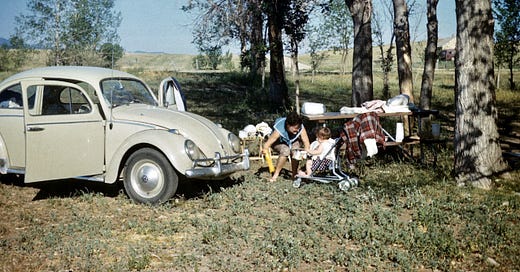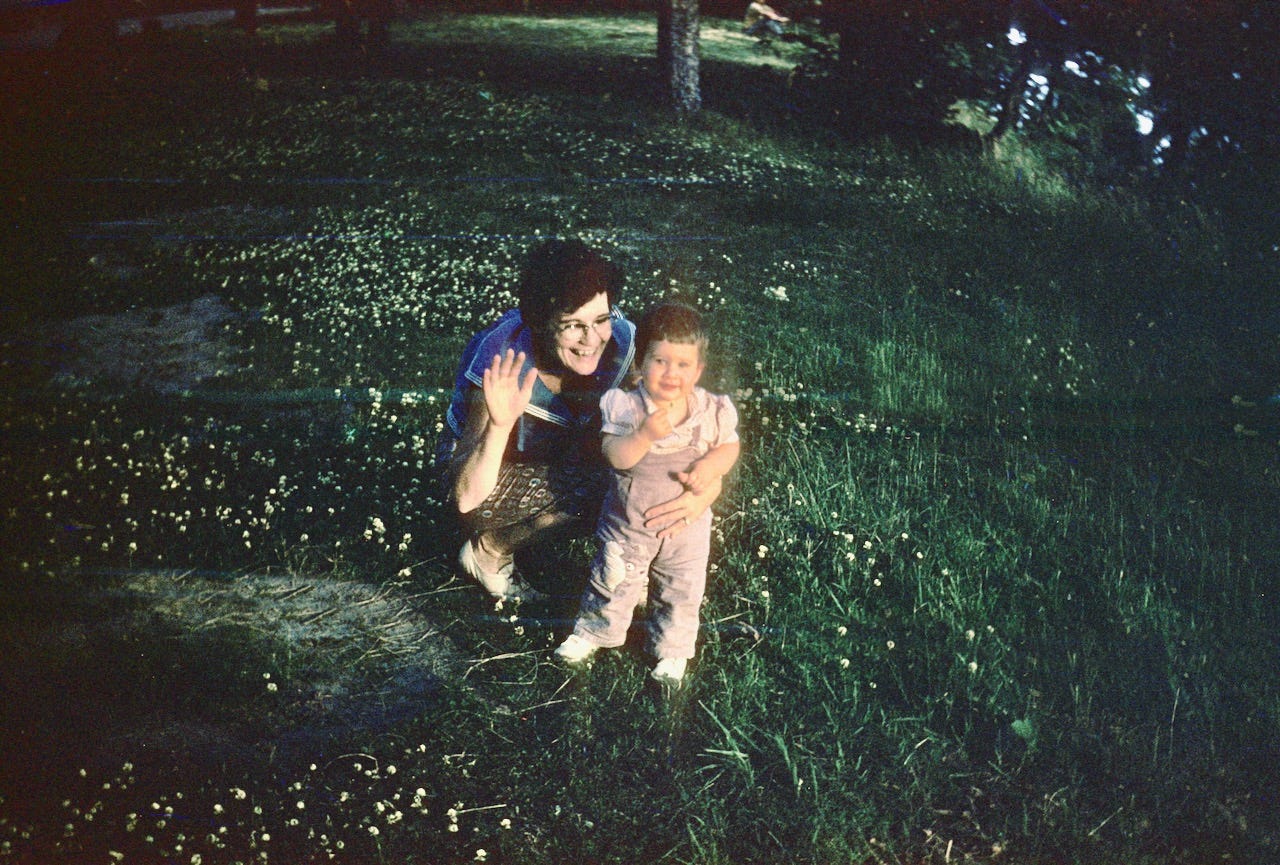After Dad’s foot care appointment, I ask if I should drive them to the Junction City DQ, ten miles farther away than the establishment close to their residence. The sky doesn’t appear Novemberish; blue bands alternate with cotton-fiber clouds, and the car’s outside thermometer reads 57.
Dad calls out, “What do you think, Mom? Should we go to Junction City?” Her face shows no emotion. She sits behind Dad, next to her walker stored behind me. Earlier I wrestled his walker into the “far” back space of our Prius “wagon.” Some days this is how we roll.
Mom has trouble hearing, but to keep track of tiny ear amplifiers is an activity of the past. Dad repeats his question with greater volume, and she gets it. “Yes,” she says and smiles and squints out the window at passing farm fields, while Dad speaks of memories along Highway 99: the driving range he often visited, the pond where he fished.
Nearing Junction City Dad points left. “There’s where we bought our fifth wheel. We sure got great use out of it.” I recall worrying about them in their 70s going camping at the coast and into the mountains, hauling their large, lovely trailer behind a pickup that barely fit the size requirement for such a job. But it’s true my parents relished every mile until the fifth wheel was sold.
Buying and often trading in vehicles isn’t a strange pastime for most Americans — unless you’re my husband, who still owns the 1966 Ford Falcon in which he learned to drive. (Nowadays we mainly use the above-mentioned Prius his dad gave us. It’s pretty necessary, since my joints and muscles no longer handle manual braking and steering with ease.) Mom and Dad enjoyed the mid-century method of experiencing newer, yet always used cars, such as their first Volkswagon Beetle pictured above.
That summer we three were traveling from Indiana to Oregon. This was way back in their canvas pup-tent days. I was maybe 15 months old and am told I slept swaddled at their feet each night. During the day I rode, harnessed, in the VW’s back area, where Dad had taken out the seat and set a board across for storage and for me.
As a mid-century baby born in the Midwest, I’m intrigued lately by ideas about our present era’s woes and wonders. My time is quite limited for surfing the net (do they still even use that term?). I’ve given up pretty much on social media. Once watching YouTube, though, I heard of author Paul Kingsnorth and was, you might say, encouraged. Well, I was also a little concerned, because people (writers, Christians, Orthodox believers) were suddenly making a big deal of him, and people who become sudden big deals don’t always end up in good places.
But I liked his sentences. I recommend his 2019 “semi-memoir,” Savage Gods.
My only similarity to Kingsnorth is that I first went to an Orthodox church around age 50 and, shocked, realized this was it. His website features an essay of amazement at becoming Christian at all. He looks into “wild” Christianity, and his remarks influence and enhance some thoughts I’ve long held.
Grappling with what he calls the Machine, Kingsnorth encourages me to muse further than perhaps I would have on the subject of culture. I’m wary and weary of much tech and kitsch that’s meant to help us; I’m no new thinker here. I grew up as we all have with vehicles and highways, and I still enjoy road trip journeys. But I’ve noticed the inventions along the path get more adept at driving me.
I’m thinking that in age-old times, the entities like those who now fuel the Machine built Empire. More than a few early Christians got in the way of Empire; they were often summarily exposed and executed. Theirs was a vulnerable, luminous lifestyle. It could and can be called the way of the Cross.
After Mom, Dad, and I find a table inside the nearly-empty DQ they unwrap their cheeseburgers. Mom watches log trucks passing on 99, but mainly she eats. They’re both hungry for this late lunch, and Dad looks pleased when I remind Mom she can have a hot fudge sundae for dessert.
Old age, I muse, is a cross-bearing journey. The Machine and Empire of culture seeks to fuel, to build, an escape from being humbled by infirmity, but this idea ultimately fails. I’ve observed enough of the elder care industry to conclude it will likely steer and control each of us who make it to a certain age. Of course, its employees are also driven, compelled, by their need to earn a living. These days I’m grateful they take on this work (and that many of them really care) — it’s a greater comfort to me than delectable fast food.
For many reasons my parents made it a priority to love each other. Yep, for better or for worse; in sickness and in health. Their road together has become gravel. Yet even within the machinery, love grants real life. Dad has his down days. But right now, across from Mom as she spoons up another mouthful of fudge-covered ice cream, I watch his face and know. Same as when he grabbed the camera on an age-old trip to Oregon and called, “Smile!” Love is his culture, his journey.





So beautiful! We age, we change, the world around us alters. Some things remain the same.
Your parents' old Beetle looks very much like my first vehicle, a 1962 bug.
That’s cool, Denise, about your Bug. Thanks for reading.